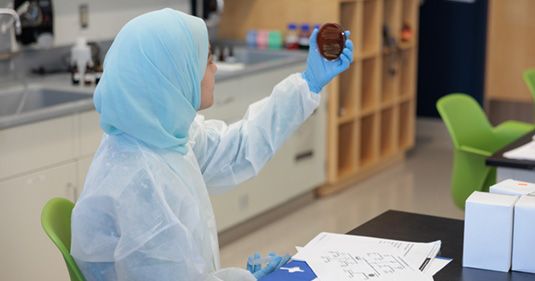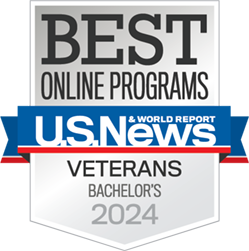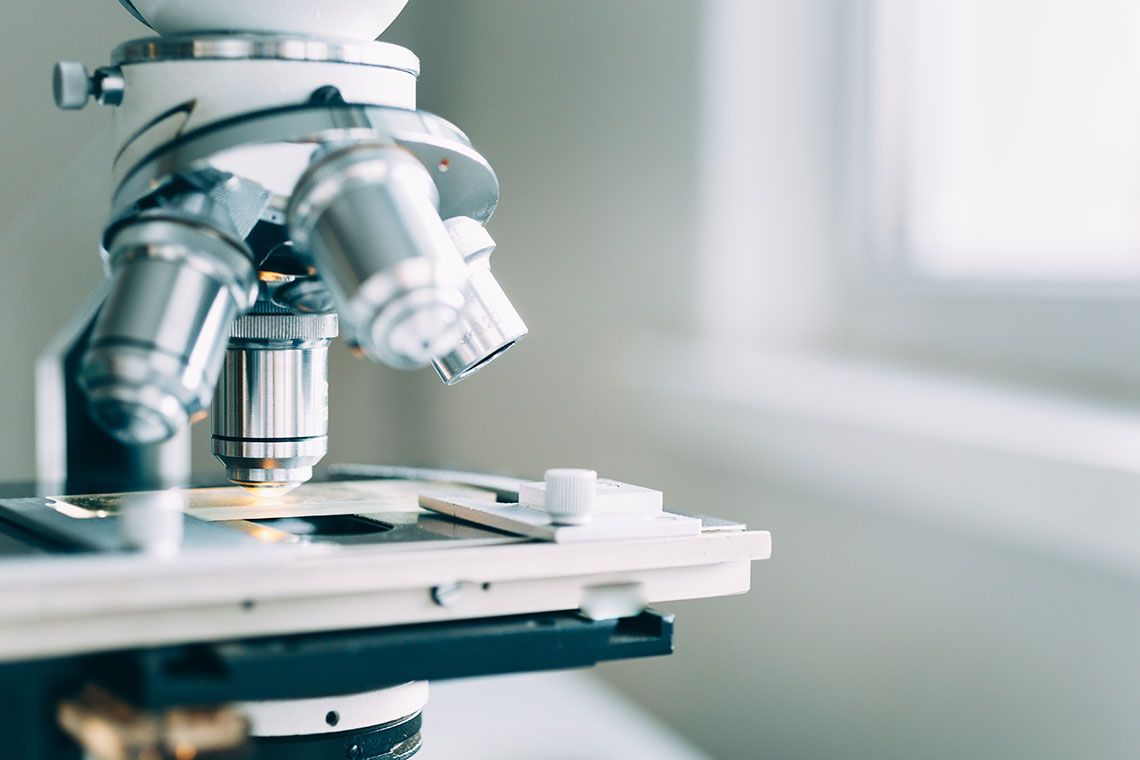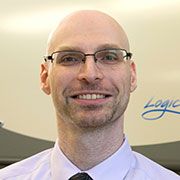
Master Biomedical Technology
100% Online
12 Months
The George Washington University’s (GW) online Post-Baccalaureate Certificate in Microbiology for Medical Laboratory Science prepares you with the knowledge and hands-on skills to become board-certified in laboratory science and make a positive, direct impact on medical care. This microbiology certificate program provides you with the latest biomedical instruments and molecular techniques to face challenges in finding and understanding the causes of disease.
Program Highlights
- Online courses, no visits to campus required
- Qualify for the ASCP exam in Microbiology (M)
- Qualify to sit for the American Society for Clinical Pathology (ASCP) Technologist in Microbiology (M) exam in as few as 12 months*
- Clinical practicum waivers are available for qualified students
Program Outcomes
When you complete the Post-Baccalaureate Certificate in Microbiology for Medical Laboratory Science you will be ready to:
- Apply principles of traditional and molecular laboratory procedures to perform diagnostic analyses
- Correlate laboratory data and quality control data to assess patient test results
- Apply knowledge of laboratory science principles as they relate to human disease diagnosis
- Comply with laboratory safety regulations and regulatory policies
- Apply ethical decision-making to issues related to clinical laboratory practice
Request Information
* Indicates required field
- Read: Privacy Disclaimer Acknowledgment
-
By submitting your contact information, you are providing your express consent authorizing GW and GW's representatives to contact you by email, phone, or text (including the use of an automatic dialing system). Standard text messaging and/or data rates may apply.
If you do not provide your contact information (phone and email), we may not be able to provide you with the information you requested.
If you provided your contact information but no longer wish to receive phone calls, emails, or text (SMS) messages from GW, you will have the option to opt-out. Emails and Text messages will include details for unsubscribing/opting out. To opt out of receiving phone calls from GW, contact us via email at info [at] hsprograms [dot] gwu [dot] edu (info[at]hsprograms[dot]gwu[dot]edu) or text/ call: 202-792-2819.
By submitting your information via this form, you also confirm that you have read and understood the GW Statement of Privacy Practices.
Note that the consent requested above is not required for enrollment in GW's programs. If you do not consent to providing the information requested on this form, you may contact us via email at info [at] hsprograms [dot] gwu [dot] edu (info[at]hsprograms[dot]gwu[dot]edu) or text/ call: 202-792-2819.
Accreditation and Rankings
- GW is accredited by the Middle States Commission on Higher Education
- #62 Best National University*
- #13 Best Online Bachelor's Programs*
- #7 Best Online Programs for Veterans*
* The U.S. News & World Report – 2024 Rankings



Curriculum
The online Post-Baccalaureate Certificate in Microbiology for Medical Laboratory Science (MLS) requires completion of 20 credit hours. Completion of the certificate qualifies the graduate to take the Technologist in Microbiology examination offered by national certifying agencies.
Who Is the Ideal Student for This Program?
Microbiologists are self-sufficient, precise, and thorough in their work. They can handle the pressure of being vital members of the health care team by recommending methods of testing, obtaining and transporting clinical specimens, as well as utilizing advanced technologies to confront emerging diseases. They also possess excellent critical-thinking and communication skills to interpret lab results.
This certificate program is best for those who have successfully completed a bachelor’s degree, typically in a science such as biology, chemistry, or microbiology, and want to pursue the laboratory science profession without completing another bachelor’s degree. Clinical practicum waivers are available for qualified students.
Career Outlook
As a microbiologist, you can work in wide variety of settings, including laboratories in:
- Hospitals or clinics
- Hospitals affiliated with universities and medical schools
- Commercial and reference organizations
- Federal and state government institutions
- State and public health agencies
The U.S. Bureau of Labor Statistics projects an increase in the aging populations will lead to a greater need for using laboratory procedures to diagnose medical conditions such as cancer or type 2 diabetes.
Overall employment of clinical laboratory technologists and technicians is expected to grow 11% through 2028 (more than twice the national average), with a median salary of $52,330.1
Admission Requirements
To be accepted to this program, you must have:
| Completed application |
| Cumulative and Science GPA of 2.5 or above on a 4.0 scale |
| A bachelor’s degree |
| Resume/CV |
| Personal statement: Applicants must include a 250–500 word essay describing your reasons for undertaking study at GW, your academic objectives, career goals, and related qualifications including collegiate, professional, and community activities relevant to your program of interest. Include any substantial accomplishments not already mentioned on the application form. |
| One letter of recommendation |
Tuition Details
The Post-Baccalaureate Certificate in Microbiology for Medical Laboratory Science program at GW consists of 20 credit hours. Explore the cost per credit hour and total estimated program costs.
Note: Tuition rates are subject to change and additional fees may vary by program.
Meet the Program Director

GW’s experienced faculty provide you with the rich, practical knowledge and support needed for you to succeed in the program and in your career.
Cliff Cymrot, DHSc, MHA, MLS (ASCP)CM, SHCM, MT (AAB), MT (AMT)
- Read Full Bio
-
Dr. Cliff Cymrot is the current Program Director for Medical Laboratory Sciences (MLS) and has over 10 years of experience in combined teaching and clinical laboratory practice. In addition to his program director duties, Dr. Cymrot teaches a range of courses within the MLS program, both online and face-to-face, such as Hematology lecture and lab, Bacteriology lab, Immunohematology lab, and Molecular Diagnostics, and Capstone.
Prior to his arrival at George Washington University (GW), Dr. Cymrot worked as a medical laboratory technician at a medium-sized, 200-bed hospital in upstate NY. In 2008, Dr. Cymrot worked for Advance Magazine for Laboratory Professionals providing storylines for the comic strip “Lab out Loud” that he worked on with his brother-in-law. He has also been a contributor for several chapters in the Textbook of Diagnostic Microbiology by Mahon, Lehman, and Manuselis, as well as having various research publications.
He is also a member of the DC chapter for the American Society for Clinical Laboratory Science (ASCLS), American Medical Technologists (AMT), and the American Association of Bioanalysts (AAB). He also holds certifications in ASCP, AMT, and AAB in Medical Laboratory Science, and Specialist in Hematology.
In 2010, he earned his B.S. in Medical Technology from the University of Cincinnati (UC). He was then promoted to medical laboratory scientist and soon after began working as an adjunct instructor for SUNY Orange teaching Microbiology for Health Professionals, Fundamentals of Anatomy and Physiology, and Certification Preparation. In 2014 he earned his a master’s degree in Health Administration from UC.
After graduation, he received an offer to facilitate an online graduate level course in health systems management at UC. In 2015 he was offered a position at GW to teach all of the laboratory courses in the newly created BSHS in MLS blended/hybrid program. After three years he was offered the Program Director position for the undergraduate MLS program here at GW. In 2022 he then went on to complete his doctorate in health sciences at GW. In 2024 he was offered the Program Director position for the MSHS in Laboratory Medicine program here at GW. Dr. Cymrot is actively involved in the MLS profession and loves teaching, research, and promoting MLS.
Sources:
- U.S. Bureau of Labor Statistics (2019 September 4). Clinical Laboratory Technologists and Technicians. Occupational Outlook Handbook. Retrieved on February 20, 2020
*Since each state may have different requirements for licensure, each student is encouraged to contact their state’s regulating agency and review these requirements prior to beginning any degree program. States requiring licensure may require extended duration of practicum experiences, additional academic courses (outside the student’s program of study), etc. These additional requirements may require you to take a course or courses outside of GW.
In particular, New York and California have additional requirements for state licensure. Both NY and CA require extended times for practicum rotations. Please also be aware that the fully online post-baccalaureate certificate programs do not meet the student lab requirement for NY state licensure. Also, for those applying to the fully online post-baccalaureate categorical certificates in hematology, microbiology, blood banking, and chemistry, the state of New York does not provide licensure for categorical certification (e.g., Technologist in Microbiology, Technologist in Blood Banking, etc.). We recommend that students who live in New York or California or plan to relocate to New York or California do research to determine the NY and CA licensure requirements.
National Accrediting Agency for Clinical Laboratory Sciences (NAACLS)
5600 N River Road, Suite 720
Rosemont, IL 60018-5119
Curriculum Details
20 TOTAL CREDITS REQUIRED
The 100% online Post-Baccalaureate Certificate in Microbiology for Medical Laboratory Science (MLS) requires completion of 20 credit hours. Completion of the certificate qualifies the graduate to take the Technologist in Microbiology examination offered by national certifying agencies.
Core
- MLS 4116 Clinical Bacteriology I (3)
-
Principles of clinical microbiology with emphasis on pathogenic characteristics, isolation, and identification of bacteria related to human disease. The course focuses on the theoretical approach to the current diagnostic techniques and identification systems used in clinical practice. Various topics, including disease causation and laboratory identification of medically significant bacteria will be discussed.
- MLS 4117 Clinical Bacteriology II (2)
-
This course presents the etiology of infectious diseases in different body sites with an emphasis on the epidemiology, pathogenic mechanisms, and laboratory identification of suspected etiologic agents. Various topics, specimen collection and handling, diagnosis and treatment of medically significant bacteria will be discussed.
- MLS 4119 Parasitology, Mycology, and Virology (2)
-
This course covers the principles and procedures involved in the diagnosis of parasitic, fungal, and viral infections. Various topics, including disease causation, specimen collection, and handling, laboratory identification, and treatment of medically significant fungi, parasites and viruses will be discussed.
- MLS 4141 Immunology and Serology (3)
-
Principles of the immune system’s components, functions, interactions with microorganisms, and the clinical applications of immunologic assays to human health and disease.
- MLS 4151 Molecular Diagnostics (3)
-
Introduction to the molecular techniques used to diagnose human disease; technology, theory, and methodology of specific molecular protocols that can be used within a clinical laboratory setting to aid in disease diagnostics including those of genetic, oncogenic, and infections origin.
- MLS 4158 Laboratory Management and Operations (3)
-
Introduction to critical concepts of lab management, including leadership theory, management principles, human resource management, financial management, quality management, and laboratory operations.
- MLS 4164 Clinical Microbiology Practicum (4)
-
Students apply medical knowledge and clinical skills gained in Bacteriology I and Bacteriology II.
Key Dates
|
Spring 2026 |
|
| Application Deadline |
November 19, 2025 (Open) |
Admissions Requirements
To be accepted to the Post-Baccalaureate Certificate in Microbiology for Medical Laboratory Science program (100% online), you must have:
| Completed application |
| Cumulative and Science GPA of 2.5 or above on a 4.0 scale |
| A bachelor’s degree |
| Resume/CV |
| Personal statement: Applicants must include a 250–500 word essay describing your reasons for undertaking study at GW, your academic objectives, career goals, and related qualifications including collegiate, professional, and community activities relevant to your program of interest. Include any substantial accomplishments not already mentioned on the application form. |
|
One letter of recommendation Letter of recommendation should be from:
Recommender will submit a letter on letterhead with a signature and credentials/contact information via the application portal. |
| Official transcripts from every college and university attended. All non-U.S. transcripts (including those in English) must be evaluated by an accredited foreign credential agency. Please find the list of member organizations here: https://www.naces.org/members. |
| Application fee: A non-refundable application fee of $80 is required. The application fee is waived for active-duty U.S. military, current GW students, degree-holding GW alumni, current McNair Program Scholars, and graduates of minority-serving institutions (MSI). |
|
Completed coursework – All required courses must be completed with a C grade (C- grades and lower do not transfer) or better at a regionally accredited institution of higher learning: 3 credits English Composition, 3 credits College Algebra, Statistics (or higher), a combination of 30 semester hours of Biology and Chemistry coursework including Microbiology with Lab. *Please be prepared to provide unofficial transcripts to determine program admissibility. *Please be prepared to provide unofficial transcripts to determine program admissibility. |
| Students who live outside of the Washington, D.C., metro area are required to secure a satisfactory clinical site at the time of admission. |
| Review the Criminal Background Check and Drug Screening Policies in the Health Sciences Programs Bulletin |
|
Post Matriculation Requirements:
Prior to Clinical Rotations:
|
|
Since each state may have different requirements for licensure, each student is encouraged to contact their state’s regulating agency and review these requirements prior to beginning any degree program. State’s requiring licensure may require extended duration of practicum experiences, additional academic courses (outside the student’s program of study), etc. These additional requirements may require you to take a course or courses outside of GW. In particular, New York and California have additional requirements for state licensure. Both NY and CA require extended times for practicum rotations. Please also be aware that the fully online post-baccalaureate certificate programs do not meet the student lab requirement for NY state licensure. Also, for those applying to the fully online post-baccalaureate categorical certificates in hematology, microbiology, blood banking, and chemistry, the state of New York does not provide licensure for categorical certification (e.g., Technologist in Microbiology, Technologist in Blood Banking, etc.). We recommend that students who live in New York or California or plan to relocate to New York or California do research to determine the NY and CA licensure requirements. |
NOTE: This program is authorized, exempt, or not subject to state regulatory compliance and may enroll students from all 50 states, U.S. territories and the District of Columbia.
International Students
Effective Fall 2025
International students should check with individual programs regarding eligibility for visa sponsorship. Generally, online and hybrid programs are not eligible for student visa sponsorship from GW. This would include transfer students from any other institution with an existing visa. To be considered for admission, there are required scores that you will need to meet. Score requirements may differ by school and program so check the admissions requirements for your program.
Applicants who have not completed a post-secondary degree from an institution where English is the sole language of instruction are required to submit TOEFL, IELTS, PTE Academic, or the Duolingo English Test scores to be considered for admission. The following are the minimum scores for admission consideration:
- TOEFL: 600 on paper based, 250 on computer-based, or 100 Internet-based,
- PTE: overall score of 68,
- IELTS: an overall band score of 7.0, with no individual band score below 6.0
- DET overall score of 120.
Undergraduate applicants who meet one of the following conditions may be considered for admission without submitting TOEFL, PTE or IELTS or DET scores:
- You have earned an associate’s degree or higher from an institution where English is the sole language of instruction
- You are a citizen of an English-speaking country
Scores may not be more than two years old. To ensure TOEFL scores are sent to GW, use institutional code 5246. An institutional code is not required to send IELTS or PTE scores to GW. DET scores must be submitted via the Duolingo English Test system directly to GW.
Based on the results of your English Proficiency exam results and your application, you may be required to take English for Academic Purposes (EAP) during your first year of study at GW. Please note that GW evaluates each application holistically so applicants may still be recommended for EAP even if they meet the requirements for exemption. Students placed in EAP courses should anticipate additional tuition expenses as well as possible extension of time needed to complete their degree programs.
Official transcripts from institutions outside the U.S. must be accompanied by an official transcript evaluation from an accredited independent evaluating agency. Please be sure you request a detailed evaluation that includes all course titles, credit hours, grades, U.S. degree equivalency, grade-point averages (GPA), and date of degree conferral (course by course evaluation). For a list of acceptable foreign credential evaluation services, please visit NACES.
Supporting documents not submitted online should be mailed to:
Mail: George Washington University
ATTN: Transcript Processing Center
1415 W 22nd St.
Suite 220
Oak Brook, IL 60523
Alternatively, official electronic transcripts can be sent to: transcripts [at] hsprograms [dot] gwu [dot] edu (transcripts[at]hsprograms[dot]gwu[dot]edu)